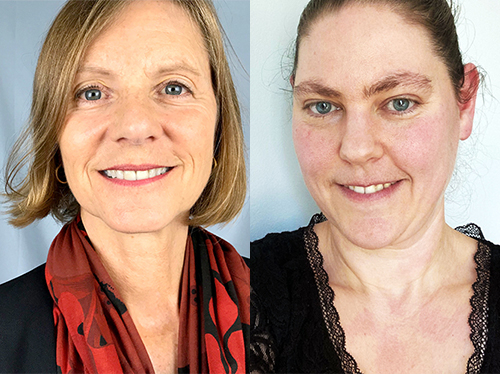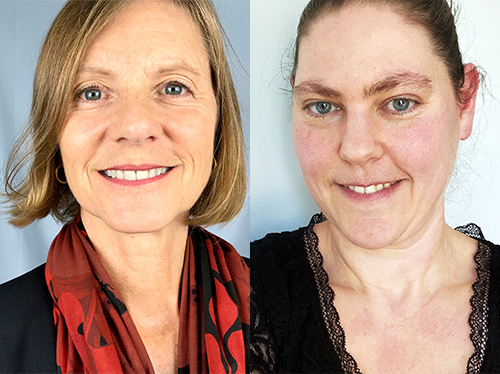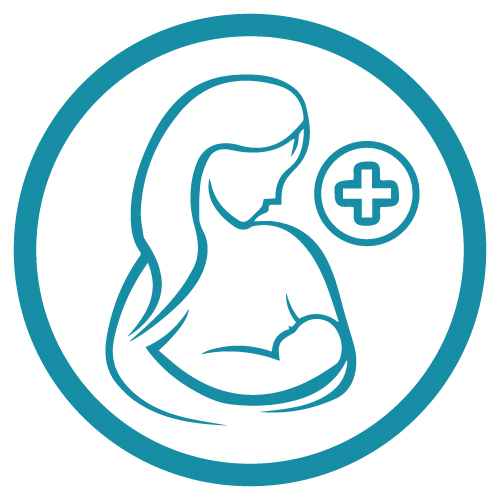 IBCLC Detailed Content Outline: Psychology, Sociology, and Anthropology Focused CERPs - Section V
IBCLC Detailed Content Outline: Psychology, Sociology, and Anthropology Focused CERPs - Section V
Access CERPs on Psychology, Sociology, and Anthropology for the IBCLC Detailed Content Outline recertification requirements. Enjoy convenient on-demand viewing of the latest Psychology, Sociology, and Anthropology focused IBCLC CERPs at your own pace.

Dealing With the Tough Ones: Counseling in Difficult Situations

Cathy Carothers is co-director of Every Mother, a non-profit organization providing lactation training for health professionals. An International Board Certified Lactation Consultant since 1996, she has provided more than 600 training events and conference presentations in every U.S. state/territory and several countries. She is past president of the International Lactation Consultant Association (ILCA), a fellow of ILCA, and past chair of the U.S. Breastfeeding Committee. She chairs the design team for the equity initiative in the lactation consultant profession, and chairs the Monetary Investment for Lactation Consultant Certification (MILCC), which works to reduce financial barriers to the IBCLC exam. She has directed several national breastfeeding promotion and support initiatives for the U.S. federal government, including the national USDA WIC peer counseling program, and national workplace support initiatives through the U.S. Department of Health and Human Services. She was honored with the 2014 National Leadership Award from the National WIC Association.
Topic: Dealing With the Tough Ones: Counseling in Difficult Situations - [View Abstract]
Topic: Making it Work: Supporting Nursing Moms at Work - [View Abstract]
Do you ever find yourself wishing you had just the right words in a difficult counseling situation? When time is limited and the pressure is on, it can be challenging to use our best counseling skills when assisting mothers with breastfeeding...especially when clients are difficult or special circumstances exist. This session will tackle some of the most common challenging situations, including interfering grandmothers, apathetic dads, resistant moms, and colleagues who do not support you. The session will also address strategies for addressing clients who do not speak your language and ways to help women feel empowered and confident they can deal with breastfeeding concerns.


Heidi Heflin RN, MN, CPSTI became a Child Passenger Safety (CPS) Technician in 2013, then an instructor with training in transportation of children with disabilities and school bus transportation. A year later, she established the CPS exhibit at the American Academy of Pediatric Conference for >10,000 attendees seen annually since. She instantly saw the need to combine her experiences by advising, educating, and advocating for nurses in CPS, leading to national, then international presentations. In 2018, she relaunched CPS-In-Healthcare Google group to support hospitals without CPS staff. She’s written for NANN E-News for neonatal nurses and CPS Express for CPSTs. In 2021, she joined the Association for the Advancement of Automotive Medicine and is revising their child restraint policy. She was named a Kidz in Motion ‘CPS Hero’ 2019, 2022, and was a recipient of the SafetyBeltSafe U.S.A. 2022 Siegel Child Safety Restraint Award. Her research examining neonatal nurses’ CPS knowledge and practice is pending publication. Heidi ‘s fervor is for working with CPS pioneers in lower- and middle-income countries. Her favorite work is with CPS Malaysia especially when she met with the Director of the Road Safety Council in 2018. When not working, she cycles with friends, hikes with her dog Olive, or ocean-swims with dolphins.
Carrie Rhodes is the Passenger Safety Program Coordinator at Nationwide Children's Hospital in Columbus, Ohio. She is a Child Passenger Safety Technician-Instructor, Certified Health Education Specialist, and instructor for Safe Travel for All Children: Transporting Children with Special Healthcare Needs, and holds a Master of Transportation Safety Administration from Clemson University. In her role as Passenger Safety Program Coordinator, she focuses on facilitating safe transportation at the time of discharge for patients of all ages, from neonates to teens. Her work includes frequent assistance with car seat tolerance screenings across the hospital's neonatal intensive care units, working with families and clinical staff to achieve the correct balance between a neonate's cardiorespiratory safety and their protection in the event of a motor vehicle crash. She is passionate about ensuring NICU staff understand the importance of both neonate positioning and proper car seat use, as well as remaining abreast of the most currently available evidence to inform transportation decisions and practices.
Healthcare professionals play an important role in promoting the safety of neonates during motor vehicle travel. Properly securing neonates in age- and size- appropriate car seats reduces the risk of serious injury or death from a motor vehicle crash, yet research and field data show most infants and children are incorrectly secured in their car seats. Additionally, screening fragile infants for positioning and tolerance in their car seat reduces the risk of cardiorespiratory compromise. However, research demonstrates that although the American Academy of Pediatrics continues to recommend that at-risk infants be monitored for tolerance in an appropriate car seat or car bed, knowledge, policies, and practices vary widely between healthcare institutions. In light of these concerns, this presentation will review the rationale behind the recommendation to complete a Car Seat Tolerance Screening (CSTS) and discuss common misconceptions about the process and results. Additionally, the steps to set up and conduct a CSTS will be discussed, including a focus on proper harnessing and positioning of the neonate. Finally, the scope of practice of the provider, the bedside nurse, and the hospital’s Child Passenger Safety Technician will be explored.

Diet Culture and Fat-Phobia: Supportive Counseling Around Weight, Health & Lactation

Bonnie Holt Logsdon (she/her), is a Registered Dietitian, International Board Certified Lactation Consultant, and Certified Lactation Educator™ through CAPPA, and a DONA-trained birth doula with over 18 years of experience in community-based practice.
In her private practice, Bonnie Knows Breast, she blends her nutrition and lactation work to support families during the prenatal and postpartum periods. Bonnie also mentors IBCLC candidate students, teaches the Certified Lactation Educator (CLE) course, and offers public speaking on lactation and nutrition-related topics.
Bonnie is committed to giving personalized, affirming care and education to each family, individual, and professional she works with! Supporting families during this critical and emotional time in their lives is such important work. Bonnie promises compassionate, non-judgmental support and information.
Bonnie and her husband Brent, have a 7-year-old son, Finley. They enjoy quality time together playing board games, cooking, traveling, and hiking in as many National Parks as possible.
The mission of Bonnie Knows Breast is to empower people with education to make informed decisions related to their health and the health of their babies. Bonnie supports families of all backgrounds, structures, and identities and believes everyone deserves to be supported in their journey.
The medical community spends a lot of time and energy discussing weight as it relates to health. This message becomes a focus particularly in the postpartum period when people begin to think about “dropping the baby weight”. A frequently shared statement about breastfeeding is that it may cause weight loss. This information can be the driver for some to decide to breastfeed.
Weight stigma is a topic that surrounds our tiny clients as early as in the womb when we talk about delivering a “big baby” or as we focus on growth charts and weight gain for babies which can be a big trigger for the parent who may have a past history of disordered eating. Comments about a baby being “too big” or having reached a certain weight and now needs solid foods sooner are often discussed.
What do our intake forms ask as it relates to weight or past history of eating disorders? How does our office furniture function to seat people comfortably with all body types? How do we communicate to clients about food intake and the impact of lactation, appropriate weight gain for a baby, or the benefits of breastfeeding?
As healthcare professionals, we have to acknowledge our own biases around weight stigma and actively work to change the way we practice to be weight inclusive for the dyad.

View Details / Enroll

Does Breastfeeding Protect Maternal Mental Health? The Role of Oxytocin and Stress

Dr. Kendall-Tackett is a health psychologist and International Board Certified Lactation Consultant, and the Owner and Editor-in-Chief of Praeclarus Press, a small press specializing in women's health. Dr. Kendall-Tackett is Editor-in-Chief of the journal, Psychological Trauma and was Founding Editor-in-Chief of Clinical Lactation, a position she held for 11 years. She is Fellow of the American Psychological Association in Health and Trauma Psychology, Past President of the APA Division of Trauma Psychology, and a member of APA’s Publications and Communications Board.
Topic: Breastfeeding Helps Mothers Overcome the Legacy of Abuse and Adversity: It Makes All the Difference - [View Abstract]
Topic: Burnout, Compassion Fatigue and Self-Care for Members of the Perinatal Team - [View Abstract]
Topic: Burnout, Secondary Trauma, and Moral Injury in Perinatal Care Providers - [View Abstract]
Topic: Does Breastfeeding Protect Maternal Mental Health? The Role of Oxytocin and Stress - [View Abstract]
Topic: Lessons to Learn from Fed Is Best: How Can We Improve Our Care? - [View Abstract]
Topic: Mother-Infant Sleep Location: It's Not as Simple as it Seems - [View Abstract]
Topic: Trauma and Breastfeeding: Working Effectively with Trauma Survivors - [View Abstract]
Topic: What’s New in Postpartum Depression? A Summary of Current Findings - [View Abstract]
Depression research contains many conclusions that appear to contradict each other regarding the role of breastfeeding. For example, breastfeeding lowers the risk of depression, but depression increases the risk that breastfeeding will fail. Moreover, breastfeeding problems increase women's risk of depression. These findings are not as contradictory as they may seem. By understanding the underlying physiological mechanism, we can understand these seemingly paradoxical findings. This presentation will describe the link between the stress and oxytocin systems, and how they relate to both maternal mental health and breastfeeding. When the stress system is upregulated, depression and breastfeeding difficulties follow. Conversely, when oxytocin is upregulated, maternal mental health and breastfeeding rates improve. This talk also includes the role of birth interventions and mother-infant sleep, as well as practical strategies that increase oxytocin.

View Details / Enroll

View Details / Enroll


Christine Bishop is a neonatologist, bioethicist, medical educator, and Assistant Professor of Pediatrics at Wake Forest University School of Medicine and Brenner Children’s Hospital in Winston-Salem, NC. She founded and directs the Brenner Children’s Hospital Care Always ™ Neonatal/Perinatal Palliative Care Program that provides holistic care for infants with life-limiting and complex medical conditions. Dr. Bishop received her MD from The Ohio State University School of Medicine and Public Health and completed her pediatric residency and neonatology fellowship at the University of Texas Health Sciences Center San Antonio. She completed a Master of Arts in bioethics at the Wake Forest University Center for Bioethics, served as the lead clinical ethics consultant for Wake Forest Baptist Medical Center, chairs the Clinical Ethics Consultation Committee, and co-directs the undergraduate medical humanities course at Wake Forest University School of Medicine.
Palliative care is a dynamic, multidisciplinary field of medicine that focuses on holistic care for patients with complex, serious, and life-limiting conditions. Neonatal/perinatal palliative care involves care for women pregnant with fetuses who have potentially life-limiting conditions, a holistic approach to family care and decision making, and care for infants with life-limiting or complex medical conditions. This session will discuss key aspects of neonatal/perinatal palliative care. We learn so much from our patients and families, and their stories will provide the framework as we work through important concepts in neonatal/ perinatal palliative care. Topics to be discussed include communication, shared decision making, managing uncertainty, pharmacologic and non-pharmacologic approaches to care, the role of hospice, and ethical issues involved in care of neonates at the end of life.

View Details / Enroll


Dr. Jennifer Barnes is the Neonatal Intensive Care Clinical Pharmacy Specialist at Levine Children’s Hospital in Charlotte, NC. She has over 10 years of experience within the field. Dr. Barnes received her bachelor’s degree at Virginia Tech and her Doctor of Pharmacy at Virginia Commonwealth University’s Medical College of Virginia. She completed her pharmacy practice residency at Alamance Regional Medical Center- Cone Health. Dr. Barnes is board certified in pediatric pharmacotherapy. She is also an active member of the Pediatric Pharmacy Association (PPA) and is currently serving as the neonatology committee chair. Dr. Barnes serves as a clinical assistant professor for pharmacy advanced practice rotations for University of North Carolina, University of South Carolina, Wingate University and High Point University. Her current research areas of interest include the role of diuretics in bronchopulmonary dysplasia treatment and antibiotic stewardship for late-onset sepsis amongst other topics.
Topic: Get the LOW Down on Neonatal Hypotension - [View Abstract]
Topic: Starbucks for Babies? Caffeine Use in Neonates - [View Abstract]
Many premature infants spend months within neonatal intensive care units (NICUs). During their NICU admission, typical preventive care ideally should also be addressed. The Centers for Disease Control and Prevention (CDC) recommends that infants and children be vaccinated at the recommended schedule regardless of premature birth. In this presentation, we will review the different immunizations given in the first six months of life that are most relevant to patients in the NICU. Additionally, we will compare distinctive immunogenic and tolerability aspects for the term and preterm population. There is also tremendous growth in new vaccines and viral prophylaxis options coming to market soon. This presentation will also address these new agents and how they are pertinent to the NICU population. So don’t miss your shot to further your immunization knowledge.

Early Vocal Contact Between Parents and Preterm Infants in the Neonatal Intensive Care Unit

Manuela Filippa is researcher at the Geneva University. She received her PhD in Developmental Psychology at the University of Paris Ouest Nanterre, she studies the effects of the Early Vocal Contact - maternal direct speech and songs - on premature infant’s development in collaboration with international research centers. She is a Musician by training, she teaches Psychology of Music and Music Education at the University of Valle d'Aosta, Italy. She became an expert in the field of early interventions in at-risk populations. Her scientific works were published in a number of international journals, in a dedicated book on Early Vocal Contact and, lastly, in a Special Issue of National Geographic, January 2019.
Early Vocal Contact aims to enhance closeness between preterm infants and their caregivers, principally through the medium of the voice. The specific aims of this presentation are;
(1) to give evidence the special orientation that newborns have towards the maternal voice;
(2) to explore the literature on the effects of the maternal voice on preterm infants in the neonatal intensive care unit;
(3) to identify and to describe the mechanisms through which early vocal contact acts as an early, family-based intervention for preterm infants and;
(4) to suggest some final recommendations for clinical practice.
Encouraging live vocal contact, with preterm infants, far from being only a sensory/acoustical stimulation, can activate a number of related and consequential actions (intuitive parenting, multimodal co-regulation, reciprocal synchronisation). These normal actions in full-term birth are at the foundation of bonding and attachment processes and can lead to long-term and sustained positive effects on the development of preterm infants.

View Details / Enroll

Eating Disorders in the Perinatal Client: A Trauma Informed Model

Kristin is a Licensed Clinical Social Worker and IBCLC in private practice in central NJ. Her practice specialties are low supply, maternal and infant mental health, and the intersection of ethnicity, sexual orientation, and gender in the care of the new family. She has spoken on various lactation, mental health, and equity topics for USLCA, the Lehigh Valley Breastfeeding Association Conference, the Appalachian Breastfeeding Conference, LPPEC, LC in PP, and for LLL of the Garden State. She designed and taught a training course on Mental Health First Aid for Perinatal Providers. She has been a featured speaker on several lactation related podcasts.
She is the mother of two children who nursed full term despite maternal IGT, and who are now 16 and 13. She is an anti racist LGBT+ activist, a member of transformative works fandoms, and makes fighting for a better world part of her daily life.
As lactation professionals, we see clients who are experiencing many challenges during the perinatal period. Clients with eating disorders are uniquely at risk, as are their babies. This presentation will educate the perinatal professional about how eating disorders present in the childbearing year and beyond. It will explore the connection between trauma and disordered eating, and teach how to be a trauma informed provider for eating disordered clients. It will discuss the specific and unique challenges the person with an eating disorder may have during lactation, including postpartum body image, elimination diets, and provider bias. The learner will gain the skills needed to screen for disordered eating and provide culturally humble and appropriate referral for congruent care.


Sarah Reece-Stremtan MD is an associate professor of pediatrics and anesthesiology at the George Washington University in Washington DC. Her clinical practice is centered at Children's National Hospital in DC, where she works as a pediatric anesthesiologist, acute pain physician, and acupuncturist. She has particularly strong interests in perioperative preservation of breastfeeding, with specific expertise in safety of anesthesia and analgesia medications used by breastfeeding mothers. She has spoken at Congressional Briefings on the need for enhanced research into the use of medications by breastfeeding and pregnant women, and sits on working group #4 within a federal task force developed to enhance Research Specific to Pregnant Women and Lactating Women (PRGLAC).
She has long been involved with the Academy of Breastfeeding Medicine, authoring multiple clinical protocols, chairing various committees, and most recently serving as Treasurer for 2 terms after 5 years as a member of the Board of Directors.
Many women plan to use various pain medications during labour, with epidural analgesia being the most common type of pain relief utilized in many North American hospitals. Medications used for pain relief during labour cross transplacentally to the infant, with varying effects demonstrated on infants and mothers with regards to breastfeeding. Here we will take a closer look at what is involved in pain transmission signals, the medications that help with pain relief during labour, and the effects of these medications on initiation of breastfeeding. We will discuss issues relating to cesarean delivery, and we will also spend a little time at the end reviewing considerations around general anesthesia for breastfeeding mothers.

Empowering Breastfeeding in Women Receiving Medication-Assisted Treatment for Opioid Use Disorder: A Call for Policy Change

Dr. Kelly McGlothen-Bell is an Assistant Professor at UT Health San Antonio, School of Nursing. As a nurse scientist, Dr. McGlothen-Bell is dedicated to understanding and resolving perinatal-infant health disparities in underrepresented groups, particularly among mother-infant dyads impacted by substance use disorders and preterm births. Dr. McGlothen-Bell uses interdisciplinary research, bio-behavioral methodologies, and community-engaged strategies to define and explore health priorities that can be remedied through culturally appropriate and sustainable health solutions. Her program of science focuses on understanding the relationship between infant feeding behaviors and readiness in high-risk infants and attunement between the primary caregiver and child during infancy and toddlerhood. The culmination of these findings contributes to the development of evidence-based interventions geared toward improving parental engagement and pediatric feeding success in marginalized populations. Dr. McGlothen-Bell has published numerous peer-reviewed articles related to developmental strategies for high-risk infants. She has also presented her work at conferences nationally and internationally. Dr. McGlothen-Bell has received numerous awards to include the 2019 National Association of Neonatal Nurses (NANN) Mentee/Mentor Grant Award. She was also selected as a 2019-2020 Academy Jonas Nurse Policy Scholar.
Topic: Feeding Behaviors in the Opioid Exposed Infant - [View Abstract]
Inequitable access to mother's milk often disempowers those who may benefit the most from it's' benefits. Moreover, suboptimal breastfeeding has the potential to negatively impact the health and well-being of future generations to come. Mother's own milk is internationally accepted as the most optimal source of nutrition for infants, yet breastfeeding initiation and duration rates among minority populations (i.e., women with opioid use disorders [OUDs]) continue to lag significantly behind that of the general population. The implications of the current U.S. opioid crisis and its increasing influence on women of reproductive age presents important considerations for the ways women and infants may receive inequitable access to breastfeeding and the benefits of mother's milk. In this presentation, learn the keys needed to empower lactation support providers to advocate for the use of scientific evidence that informs breastfeeding practices for women receiving MAT for OUD.

View Details / Enroll
















